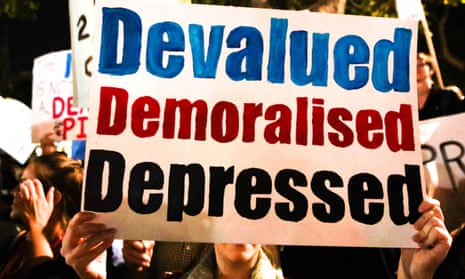There has been a huge surge in the number of junior doctors joining the British Medical Association (BMA) in the wake of the row over contracts, according to the union.
Between 26 September and 5 October, a total of 5,451 doctors joined the BMA, bringing the total membership to just less than 160,000. About 80% of the new members are junior doctors.
The rise in membership comes after the BMA said it would ballot its members over possible strike action. Negotiations – including a meeting with the health secretary, Jeremy Hunt – have broken down over conflict regarding working hours and pay.
The government has said it plans to impose the new contract on doctors, up to consultant level, next year.
The contract will reclassify doctors’ normal working week to include Saturdays and up to 10pm every night of the week except Sunday.
Medics argue they will lose out financially as evenings and Saturdays will be paid at the standard rate rather than a higher rate. They say this amounts to pay cuts of up to 30%.
Dr Mark Porter, chair of the BMA council, said of the rise in membership: “These new membership figures are an indication of the anger felt by not just junior doctors, but the profession as a whole.
“Instead of genuine negotiations, the government has insisted that junior doctors accept recommendations without question.
“This would not have allowed the BMA to negotiate over proposals we believe are unsafe for patients, unfair for doctors and undermine the future of the NHS.”
The news comes after former health minister Dan Poulter said the anger from doctors was understandable and based on “valid” concerns, including about patient safety.
Poulter said that when he was overseeing negotiations over the contracts last year, the coalition government had reached “many areas of broad agreement with the BMA” including the need to improve training and finding a better way of remunerating medics for on-call work at night and at weekends.
But the contract now being imposed is very different, he said.
“Then there was no talk of 90-hour weeks, no talk of large numbers of junior doctors having their pay cut.
“There was instead a recognition by the Department of Health that now appears to have been lost: that better pay and work-life balance incentives were needed to ensure doctors were attracted to A&E and other gruelling specialities.”
Hunt, speaking at a fringe event at the Conservative party conference in Manchester, said: “In politics you do get quite a lot of angry ex-minsters who opine with their views but, I have to say, in office Dan and I never disagreed on this issue, and we both recognised that we needed to find a way to make it easier for hospitals to roster to protect patients who are admitted at weekends.”

Comments (…)
Sign in or create your Guardian account to join the discussion